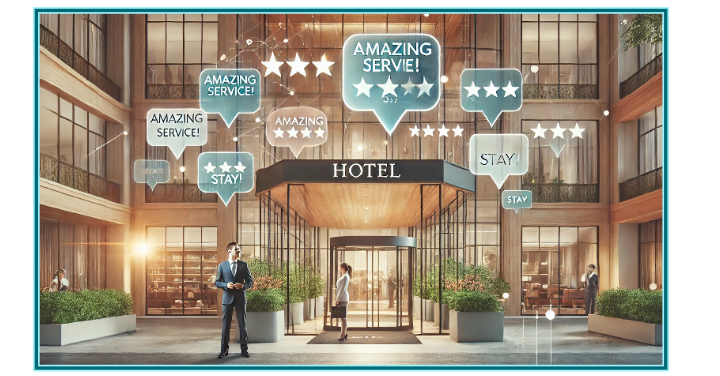Effective hotel reputation management is crucial for success in the hospitality industry, as online reviews and social media significantly influence public perception. A positive image directly impacts bookings, guest loyalty, and customer satisfaction.

What Is Reputation Management in Hospitality?
Reputation management in hospitality encompasses the strategies and practices that hotels use to maintain and enhance their image among customers, especially in an era where online reviews and social media significantly influence guest satisfaction and overall success.
This includes actively monitoring and responding to online reviews, utilizing reputation management software, and employing analytics tools to gather guest feedback. Hotels can effectively manage their reputation and ensure a positive guest experience by prioritizing brand awareness and building trust and credibility.
https://bigmagazinepro.com/rising-construction-site-accidents-in-urban/
Why Is Reputation Management Important for Hotels?
Reputation management is vital for hotels, as it directly influences customer satisfaction and significantly impacts online visibility and success. A strong reputation fosters trust and credibility with potential guests, increasing bookings and enhancing guest loyalty. Where online reviews can shape a hotel’s image, proactive reputation management strategies are essential for securing a competitive advantage and nurturing long-term customer relationships.
A hotel’s reputation fundamentally affects its business by shaping customer trust and influencing decision-making, particularly on platforms like TripAdvisor and Google Reviews. Positive feedback can lead to increased bookings and higher revenue, while negative reviews can deter prospective guests and damage brand image. To address this, hotels must prioritize timely review responses and engage effectively with their customers.
Successful engagement strategies, such as promptly addressing positive and negative feedback, demonstrate that management values customer opinions. Additionally, incorporating positive testimonials into promotional materials and highlighting guest experiences through social media campaigns can further bolster a hotel’s reputation. Ultimately, hospitality businesses must recognize the intrinsic link between their reputation and overall success, continually adapting their strategies to foster customer trust and enhance guest satisfaction.

What Are the Key Elements of Reputation Management in Hospitality?
Online Reviews and Ratings
Online reviews are pivotal in shaping a hotel’s reputation, providing prospective guests with insights into past experiences. By utilizing review monitoring tools and promptly responding to feedback, hotels can enhance their appeal, build trust, and maintain a favorable online reputation.
Social Media Presence
A robust social media presence is essential for engaging with audiences, promoting brand image, and addressing customer inquiries in real-time. By posting high-quality content and responding to guest reviews, hotels can demonstrate their commitment to customer satisfaction while employing storytelling and user-generated content to foster emotional connections with potential guests.
Brand Image and Messaging
A hotel’s brand image and messaging are crucial for reputation management, influencing customer perceptions and loyalty. By ensuring consistent branding, engaging with customers, and utilizing storytelling, hotels can create an emotional connection with guests and strengthen their identity in the market.
Customer Service and Guest Experience
Exceptional customer service and a positive guest experience are fundamental to reputation management, directly impacting satisfaction and repeat business. Comprehensive employee training, attention to cleanliness, and loyalty programs are vital in enhancing guest experiences and fostering a positive hotel reputation, ultimately leading to increased bookings.
How Can Hotels Monitor and Improve Their Reputation?
Hotels can enhance and monitor their reputation by integrating thoughtful response strategies with continuous feedback collection from travel websites like TripAdvisor and Google Reviews. Regularly analyzing guest feedback helps identify areas for improvement, allowing hotels to proactively address potential issues that could harm their image. Responding to positive and negative reviews is crucial, as it demonstrates to guests that their opinions are valued and that the hotel is committed to enhancing the overall guest experience. Timely and personalized responses foster a sense of connection, while constructive engagement with negative feedback highlights a proactive management approach.
In addition, engaging with customers on social media is essential for building brand awareness and strengthening relationships. Hotels can create a more interactive experience for their audience by sharing captivating content and initiating conversations. Posting stunning visuals, behind-the-scenes insights, guest testimonials, and local attractions can entice potential guests and encourage sharing. Successful brands like Marriott and Four Seasons exemplify this by showcasing user-generated content and crafting compelling stories that draw customers in and enhance their reputation.
Implementing a robust crisis management plan is vital for effectively addressing negative feedback and protecting a hotel’s reputation during unforeseen circumstances. By preparing for potential crises and establishing clear communication strategies, hotels can mitigate damage and reassure guests. After a crisis, focusing on recovery efforts and adapting to guest needs is key to transforming challenges into opportunities for growth. By acknowledging concerns and taking tangible steps for improvement, hotels can ultimately enhance guest satisfaction and trust, leading to a stronger reputation.
What Are the Common Challenges in Reputation Management for Hotels?
Hotels encounter a range of challenges in managing their reputation, including handling negative reviews, balancing their online and offline presence, and effectively navigating multiple platforms to engage with guests. Addressing negative feedback is particularly critical, as poor reviews can erode customer trust and damage a hotel’s overall image. To counter this, hotels must develop proactive response strategies demonstrating a commitment to improving guest experiences. Timely and personalized replies to feedback can transform criticism into valuable opportunities for enhancement.
Moreover, balancing online reviews with in-person interactions necessitates a cohesive approach to ensure consistency in brand messaging. Hotels should implement comprehensive management tools to efficiently oversee their online platforms, allowing them to maintain visibility and a positive reputation. This involves actively monitoring customer sentiment and streamlining communication across various channels. By fostering transparency and empathy in their interactions, hotels can create stronger relationships with guests. Consistent training for staff and engagement strategies further enhance this effort, ultimately leading to improved customer loyalty and trust. With these strategies, hotels can navigate the complexities of reputation management and thrive in a competitive environment.
3 Comments